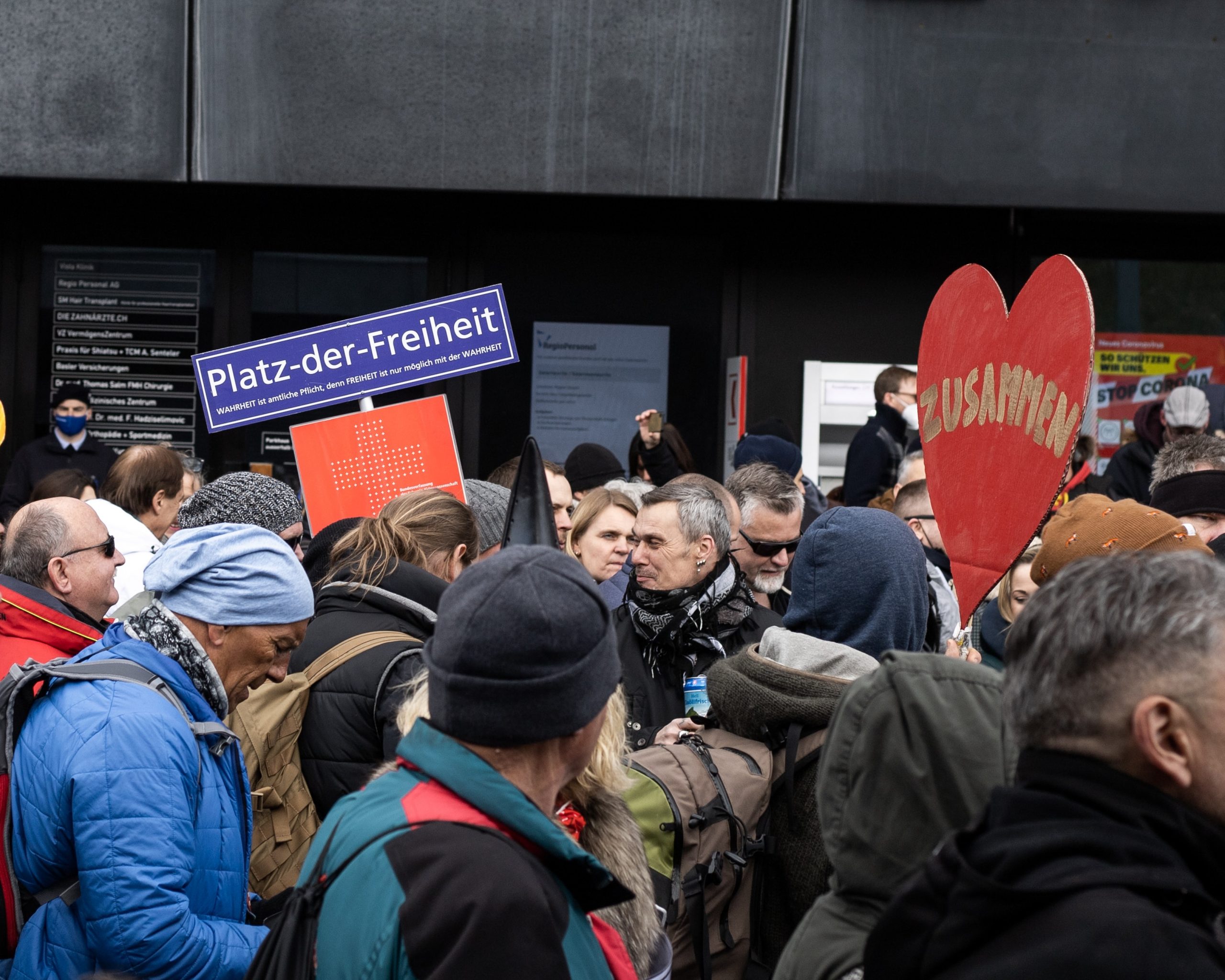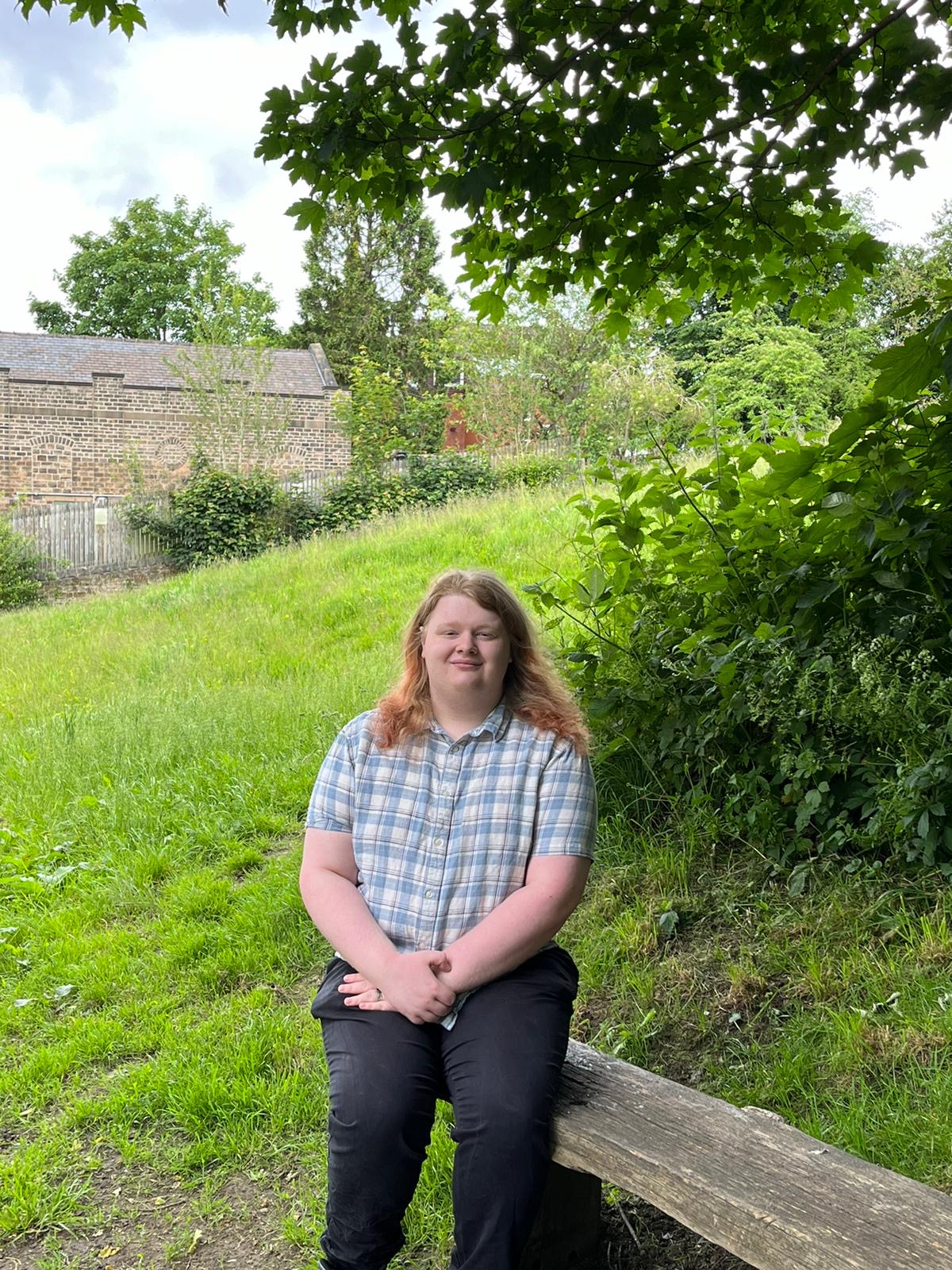by Miriam Kuepper
Following the latest lockdown measures across Germany and Austria, the Swiss government has also been given the power to impose stricter Covid restrictions.
Unlike most countries, Switzerland needed permission from its voters to implement controls to curb socialising.
Last Sunday, the government secured power to keep and alter a Covid certificate, enabling only those who have been vaccinated or recovered to socialise in all public settings.

There were many demonstrations against Covid measures in Switzerland.
The referendum on the Covid-law
The referendum to remove restrictions, including the certificate, came after a series of demonstrations against measures and opponents of the law stating it was a restriction of their freedoms – violating their human rights.
Dr Thomas Milic, a senior researcher in Swiss politics at the University of Zurich, said: “It was so controversial because it was about a topic which concerns everyone directly and which had a permanent media presence.”

Dr Thomas Milic is a senior researcher at the University of Zurich who specialises in Swiss politics. Image source: Liechtenstein Institut
Under the Swiss political system of direct democracy, the power lies in the hand of the voting population, giving the government little formal power.
As Dr Milic explains: “Switzerland is the only country in which Covid-politics were legitimised directly by the population.

To move forward with restrictions such as the Covid certificate, which became mandatory in indoor spaces including restaurants, clubs and universities in September, the government had to balance introducing restrictions with getting the voting public’s approval in accordance with their system of direct democracy.
The election of the Covid-law showed three highly emotional aspects, according to Swiss politics expert, Dr Milic. He said: “Firstly, the election was about humanity’s most valuable good: health.”
A study by Swiss publisher Tamedia shows the older population, in particular, voted in favour of the law, while many younger people voted against it.

Data source: Tamedia
“The rift between the age groups most likely stems from young people believing that older people are more likely to suffer severe repercussions from the disease than they are,” said Dr Milic.
He also considers social isolation a possible cause for the approval of the law, as people who don’t participate in public life would not care about restrictions on socialising.
Finally, there was what he calls an “age-old conflict between freedom and equality”.
Equality, as solidarity of getting both vaccines in order to achieve herd immunity, was put into question.
He said: “How far can the state go to restrict the freedom of an individual to achieve this goal?
“Opinions on this were widened and the issue is also emotional because the conflict is one of fundamental nature.”
A vaccine-critical country?
Switzerland has one of the lowest vaccination rates in Western Europe, with only 66 percent of the Swiss population being fully vaccinated.
Similarly, low vaccination rates can be seen in neighbouring countries Austria, Germany and Liechtenstein.

Switzerland has one of the lowest vaccination rates in Europe.
There are various reasons for this trend, as Dr Milic outlines: “On the one hand, there is a general skepticism of the state and an emphasis on freedom as well as individual responsibility.
“On the other hand, there is a comparatively widespread acceptance of homeopathy in the German-speaking regions.”
Armanda Gruber, 31, a sales assistant, voted against the Covid-law because she believes in her natural immune system.

Armanda Gruber is a 31-year-old sales assistant.
She said: “When I got Covid two years ago and they wanted to take me to the hospital, I called my healer.
“I had it badly for three days already, but she told me which natural medicine I should take, and just after one hour I was already feeling a lot better.
“I stopped taking medicine completely in June.”
On the side of the supporters of the Covid-law is Michael Künzli, 32, a student who hopes that the certificate will get more people to get vaccinated.

Michael Künzli, 32, is a teaching assistant who experienced the harsher Covid measures first-hand in schools.
He said: “I want to be sure that small businesses get the help they need and because the certificate is the only that can give us a sense of normality.”
This notion of hoping to avoid another lockdown like it was announced in neighbouring countries Austria and Germany and hence trying to save small businesses is shared by Lia, a 23-year-old student: “I voted for the law because my dad is self-employed and it is important for him and our family to have that financial support by the government.”

Lia, 22, feared for her family’s financial stability without the Covid law.
Finally, some voters voted against the Covid-law because they mistrust the government.
Severin Meli, 23, student, got vaccinated in the hopes of escaping restrictions.

Severin Meli, 23, feels betrayed by the government wanting to impose stricter Covid measures.
He said: “I voted ‘no’ to the law because in spring the government said if we are all vaccinated there will be no need for more restrictions and while we had a stable situation then, they didn’t remove restrictions like mask-wearing – and now we are facing harsh restrictions yet again.”
Stricter Covid measures planned
Under the Covid-law passed on Sunday, the government plans to introduce stricter Covid-measures, among which could be introducing the mandatory certificate for all public events and meetings of 11 or more people.
An announcement about the concrete measures is due at 7pm tonight.
With the new omicron variant, the newly-acquired power given by the Covid-law enables the government to act quickly in imposing new measures to combat the spread of the new variant.
Fabio Neuhaus, 27, an architect, who voted no and is not concerned about the new variant, said: “I think we will only be able to live a ‘normal’ life again when we accept that this virus will be a constant companion from now on and new variants of it will be circulating all the time.”

Fabio Neuhaus, 27, feels that neither the Covid law nor vaccination will be the way out of the pandemic.
While the dangers of the omicron variant are still unknown, Switzerland announced this week that anyone arriving in Switzerland would have to quarantine and will likely tighten restrictions as the situation develops.




